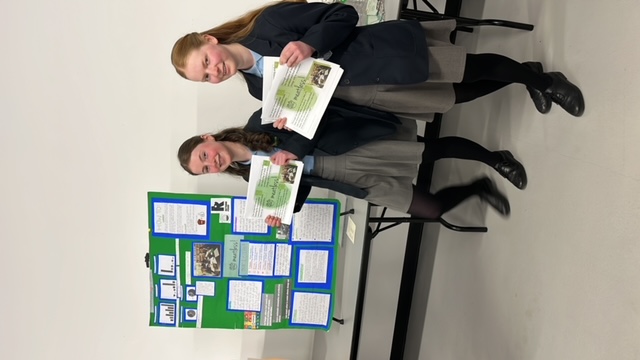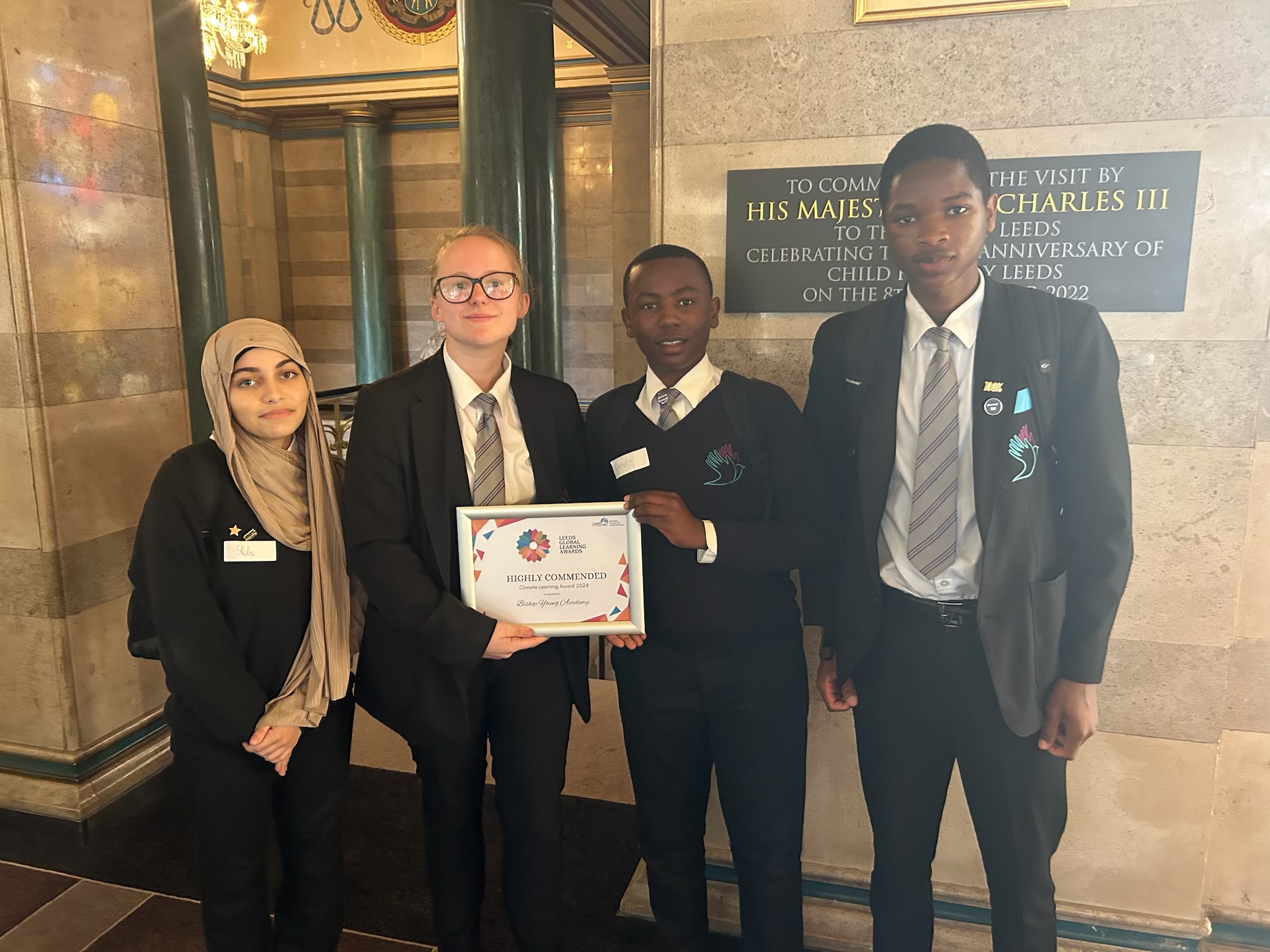 One of our Leeds area multi academy trusts has been on a journey towards net zero over the last few years, and wants to share all that they have learned with schools across the diocese.
One of our Leeds area multi academy trusts has been on a journey towards net zero over the last few years, and wants to share all that they have learned with schools across the diocese.
Embarking on the journey to carbon neutrality is crucial for our schools to lead the way to a sustainable future, as part of our diocesan Saving Creation strategy.
The story of Abbey Multi Academy Trust is a great example of our Saving Creation strategy in action, using our resources and support for schools to help work towards the diocesan goal of net zero by 2030.
The Trust currently consists of eight schools who are committed to working in partnership to educate, nurture and empower students and employees so that everyone can flourish and live life in all its fullness.
For a long time the Trust has emphasised the importance of sustainability, and their carbon footprint has always been a focus.
This was largely led by listening to student voices, who raised discussions around changes that they wanted to see and the importance of combatting climate change.
2020 was when the team really came together to drive forward changes.
The journey has had many challenges, but by breaking down what needed to happen the journey was made simpler and less overwhelming.
The Trust started by looking at the Saving Creation Toolkit for Schools, a suite of resources produced for schools by the diocese as part of our Saving Creation: Net Zero Carbon Church strategy.
These resources include a Saving Creation School Review Tool, which allows schools to track their progress through the five different areas covered by the toolkit: getting started, energy, food, travel and consumption.
The Trust began using this review tool, which helped them to break down what changes need to be made in their schools.
The Trust also completed the Church of England’s Schools Energy Footprint Tool, which identified the starting energy usage for each of their schools, allowing them to target actions and keep track of progress.
Yavannah Watterson-Hopkins, Director of Finance and member of the Trust’s Sustainability group said: “We found the Saving Creation Toolkits a great starting point in having conversations with our schools around their individual sustainability journey and to track the impact of actions taken.
“The second stage was to use the energy footprint tool to look at how we could reduce energy usage across the Trust in line with our Carbon neutral target, this has also enabled us to pass on significant savings on energy costs across the Trust.”
 They completed individual surveys for each school, to identify specific actions to be taken for each site.
They completed individual surveys for each school, to identify specific actions to be taken for each site.
This helped inform the creation of climate action plans for each school.
Eco-champions from each school were selected, and were tasked with identifying actions and developing these action plans for their school, while sustainability was embedded into the curriculum to ensure the continued engagement of pupils.
The Eco-champions meet together as a cross-Trust Sustainability Group to share best practices, successes and challenges.
In 2021, the Trust were among the first MATs in the country to receive funding through the Public Sector Decarbonisation Scheme (PSDS), allowing them to make changes to infrastructure.
The £5 million awarded by the Scheme supported the necessary surveys, for each school, and enabled new radiators and air source heat pumps to be installed in five schools.
Photovoltaic solar arrays were installed on five buildings, and since the successful PSDS application the Trust have secure funding of an additional £1 million for further improvements, including more solar panels, photovoltaic batteries, LED lighting and other building upgrades.
School Condition Allocations funding has also made possible upgrades to the fabric of several buildings, including work on building insulation, roofs and double glazing on windows.
David Ryder, Head of IT and Infrastructure at Abbey MAT acknowledged the scale of this challenge: “Our buildings are spread across eight sites, and range widely in both age and type.
“We started at a point where none were energy efficient – but after undertaking these large infrastructure projects, but now we’re in a position where we save over 700t co2e (carbon) a year and generate over 1 million kwh through solar annually.
“This shows our commitment to improving the quality of the buildings – making them efficient and sustainable learning environments.”
In 2022 the energy crisis also prompted a review into energy procurement processes, with a view to decarbonising all their energy usage.
The Trust has done lots of work changing the culture of their schools, and all schools are aligned with the goal to be carbon neutral and, and with working together to achieve this.
The Trust have worked to increase biodiversity on their sites by meeting with external experts, who are looking at their spaces to see what can be achieved.
Schools are also looking to reduce air pollution around them, including by installing electric vehicle charging points to encourage people to drive electric vehicles.
 The Trust and its schools have been rewarded for their efforts, and have looked to celebrate the hard work going on across the Trust.
The Trust and its schools have been rewarded for their efforts, and have looked to celebrate the hard work going on across the Trust.
Abbey Grange CofE Academy and Manston St James CofE Primary School have both achieved the Eco Schools Green Flag Award, meeting requirements set by the Eco Schools initiative that match well with our diocesan aims.
At the Leeds Global Learning Awards 2024, Bishop Young CofE Academy were Highly Commended and Abbey Grange CofE Academy Commended in the Climate Learning Award category, both for the embedding of climate learning into the curriculum and engaging students across different year groups in both climate education and action.
At the MAT Excellence Awards 2023, the Trust were shortlisted for an award, and were commended for the dedication of school eco-champions and student eco councils, and for the commitment and passion that are core to every part of teaching and operation in the Trust.
The Trust have also set up their own Abbey MAT Sustainability Awards, looking to celebrate their own sustainability projects and teams across all the schools.
While the Trust have made some great progress towards net zero, they are very aware that the process is a journey, and that there is still some way to go to become completely carbon neutral.
They are continuing to monitor progress, and making changes where possible, for example currently looking at water use.
The Trust is working with third party companies to help them on their journey, including UKSSN for general support and advice, and Value Match for a Trust sustainability review, which will assist in prioritising the next three years of strategy and procurement support.
The Trust have also recently signed up to the Climate Ambassadors scheme.
They are also currently looking at the potential for increasing biodiversity across all of their sites, with help of the National Education Nature Park, and have undertaken an external review through PECT of all the sites.
Implementing these changes has had a very positive response from the schools and local community the Trust serves, made possible by having a clear strategy to reach net zero, which has helped focus and align the Trust with a unified vision.
Helen Pratten, co-CEO and Executive Principal (Primaries) summarised the importance of sustainability in the education sector: “As educators, we believe that we have a responsibility to raise awareness and empower future generations to ensure the sustainability of our planet.
“We are proud to have undertaken significant decarbonisation work in our ambition to become a carbon neutral organisation.
“Reducing our carbon footprint, reducing energy bills and equipping our academies with real life data is the start of a bigger and longer-term initiative to be sustainability pioneers.”
The Diocesan Education Team is here to help all schools with their journeys to net zero.
Beth Maclean, Diocesan School Buildings Support Officer, said: “The journey Abbey MAT have taken so far is a great example of a holistic approach to tackling climate change in schools.
“They have looked at energy use, building fabric and developed a culture of sustainability within their Trust.
“Sustainability journeys can be challenging, but by working together and by taking tangible actions, we can give the next generation a better world to inherit.
“If your school is interested in making changes to drive forwards your sustainability journey reach out to myself (beth.maclean@leeds.anglican.org) or look at the Saving Creation documents for free help and advice.”
To find out more about the support offered by our Education Team, please click here.
